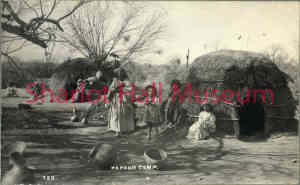Papago Camp Scene
details
Unknown Unknown inpa1102p.jpg IN-PA-1102 B&W 1505-1102-0000 inpa1102p Photo Card Print 6x9 Historic Photographs 1890 Reproduction requires permission. Digital images property of SHM Library & ArchivesDescription
When the Spanish came upon them, they called them Papago, but the people themselves have rejected this name and officially changed it to Tohono O'odham in the 1980s. Tohono O'odham means “Desert People.”
The Tohono O'odham are a Native American people of the Sonoran Desert, residing primarily in the U.S. state of Arizona and the Mexican state of Sonora. Tohono O'odham means "Desert People". The federally recognized tribe is known as the Tohono O'odham Nation.
The Tohono O'odham Nation, or Tohono O'odham Indian Reservation, is a major reservation located in southern Arizona, encompassing portions of Pima County, Pinal County, and Maricopa County and extends into Mexican state of Sonora.
Most Tohono O'odham Indians lived in wickiups. Wickiups are small round or cone-shaped houses made of a wooden frame covered with brush and dirt. These are very simple houses and Tohono O'odham people really only used them to sleep in.
The Tohono O'odham planted crops of corn, beans, and squash. Tohono O'odham men also hunted deer, javelinas, and small game like rabbits, while women gathered nuts, fruits, and herbs. Favorite recipes included cornbread and stews, which they baked in pit ovens.
The division of O’odham lands has resulted in an artificial division of O’odham society. O’odham bands are now broken up into 4 federally recognized tribes: the Tohono O’odham Nation, the Gila River Indian Community, the Ak-Chin Indian Community and the Salt River (Pima Maricopa) Indian community. Each band is now politically and geographically distinct and separate. The remaining band, the Hia-C’ed O’odham, are not federally recognized, but reside throughout southwestern Arizona. All of the groups still speak the O’odham language, which derives from the Uto-Aztecan language group, although each group has varying dialects.
Purchase
To purchase this image please click on the NOTIFY US button and we will contact you with details
The process for online purchase of usage rights to this digital image is under development. To order this image, CLICK HERE to send an email request for details. Refer to the ‘Usage Terms & Conditions’ page for specific information. A signed “Permission for Use” contract must be completed and returned. Written permission from Sharlot Hall Museum is required to publish, display, or reproduce in any form whatsoever, including all types of electronic media including, but not limited to online sources, websites, Facebook Twitter, or eBooks. Digital files of images, text, sound or audio/visual recordings, or moving images remain the property of Sharlot Hall Museum, and may not be copied, modified, redistributed, resold nor deposited with another institution. Sharlot Hall Museum reserves the right to refuse reproduction of any of its materials, and to impose such conditions as it may deem appropriate. For certain scenarios, the price for personal usage of the digital content is minimal; CLICK HERE to download the specific form for personal usage. For additional information, contact the Museum Library & Archives at 928-445-3122 ext. 14 or email: orderdesk@sharlot.org.




